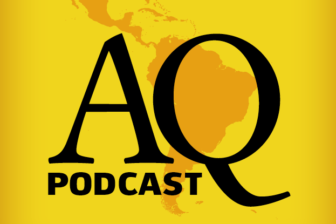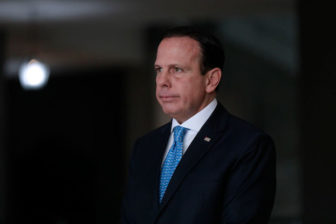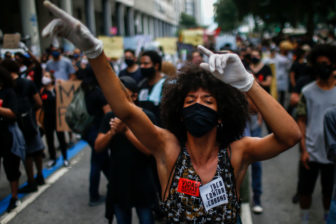Imagine, if you will:
It’s 7 a.m. on a sunny morning in Balneário Camboriú, a beach town in southern Brazil. A team of Federal Police agents pull up outside the home of Luciano Hang, a business mogul and prominent supporter of President Jair Bolsonaro famous for his leprechaun-green suits.
The agents carry an order, issued by the Supreme Court, to arrest Hang for allegedly financing an illegal “fake news” operation during the 2018 presidential election. But they discover the home is barricaded shut. Hang has been tipped off. He appears an hour later in Brasilia, smiling, next to the president. “This is an attack on democracy – and on the freedom of speech of all Brazilians,” Bolsonaro declares to a crowd of reporters and cheering supporters outside his palace. “The arrest order is absurd. We will not comply.”
The sequence of events above is hypothetical, and in real life Hang has denied any wrongdoing in the “fake news” case. But it’s the kind of scenario some observers believe could trigger the next major battle between Bolsonaro and Brazil’s other democratic institutions – and even prompt the military to intervene on the president’s behalf.
Brazil has recently been consumed by speculation that Bolsonaro could mount a so-called “self-coup” – in which he usurps power from the judicial or legislative branch, or tries to shut them down, with the support of the armed forces. This risk is taken seriously in Brasilia, and shouldn’t be dismissed. But such a sudden move isn’t really the Brazilian way – and it’s not how democracies typically fall apart in the 21st century. A gradual but inexorable decay, a la Venezuela, seems more feasible.
What would that look like? It’s not hard to imagine. Bolsonaro has already tried to draw lines in the sand at a time when numerous investigations threaten his allies. On May 27, federal police conducted search and seizure operations against Hang and a dozen other Bolsonaro supporters as part of the “fake news” case. The following day, speaking to reporters, the president was clear: “We will not have another day like this. Enough! We arrived at the limit.” He added, with specific regard to the Federal Police: “Absurd orders will not be complied with.”
When presidents begin deciding which judicial orders will be obeyed or not, that’s already a deterioration of democracy. But Bolsonaro and his supporters have constructed a narrative in which they are the ones standing up for fundamental liberties. In their view, leftist “activist” judges on the Supreme Court are persecuting Bolsonaro allies, illegally limiting their speech, and bitterly trying to overturn the 2018 election result on spurious grounds. Several figures have already said they will ignore court summons. Douglas Garcia, a member of Congress, told Veja magazine: “I consider the case unconstitutional … I’m not giving it any kind of legitimacy.” Sara Winter, an activist who recently led a Ku Klux Klan-style protest with masks and torches outside the Supreme Court, said simply: “I refuse to go to that piece of shit.”
In other words, the groundwork has already been laid for an even bigger confrontation, such as the hypothetical one involving Hang – or someone even closer to the president. What would happen in such an event? I spent this week consulting senior figures in Brasilia, and heard at least 100 different scenarios. Some believe the Supreme Court would find a way to back down. Others believe the Court would challenge the president by alleging a “crime of responsibility” – grounds for impeachment. That could, in turn, prompt a counterreaction by the military, which some believe could invoke Article 142 of the Constitution, declare the Supreme Court had overstepped its bounds and even – theoretically – try to arrest some of its members. Still others insist things would never, ever escalate that far – but if they did, the military’s loyalty to Bolsonaro would have its limits.
If it all sounds like a mess, that’s really the ultimate point. The so-called guerra de poderes, the war among Brazil’s institutions for power and primacy, has been raging for some six years now, ever since the Lava Jato case first started. The pattern is fundamentally the same: Criminal investigations endanger powerful people, who then fight for survival. The main difference now is that Bolsonaro and his allies seem more willing to defy the courts if necessary, believing the military will have their backs. That and, of course, a pandemic that has killed at least 40,000 with no signs of slowing, plus a recession likely even worse than the one in 2015-16. Brazil’s troubles only seem to get worse. Sadly, no hypotheticals necessary there.









